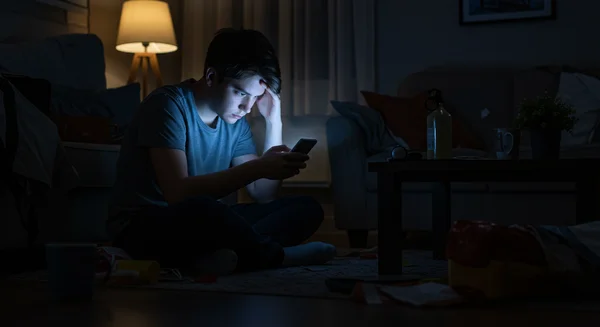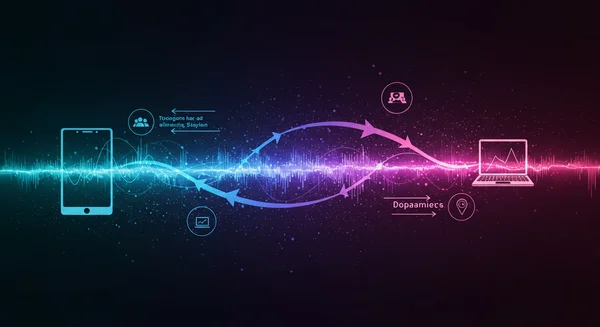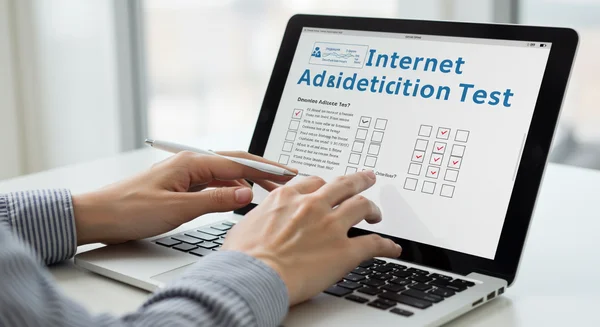Am I Addicted to the Internet? Take a Free Addiction Test Online
September 15, 2025 | By Juliana Pace
Could your constant screen time be more than just a habit? Many find themselves losing track of real-world priorities, questioning if their digital life is taking over. If you're asking, Am I addicted to the internet?, you're ready for answers. This guide will help you understand the nuances of internet addiction and offer a completely confidential way to find clarity with our specialized addiction test.
Self-assessment is your crucial first step towards understanding. It's a brave and proactive choice to explore your own behaviors. You can begin that journey right now by taking a free online test to gain preliminary insights into your online habits. This confidential tool is designed to provide clarity in a safe, anonymous environment.

Recognizing Internet Addiction Signs
It’s easy to dismiss hours spent online as normal in today's digital age. However, when these habits begin to negatively control your life, it's time to pay closer attention. True online addiction isn't just about the number of hours you spend online; it's about the loss of control and the adverse effects on your daily functioning. Recognizing the signs is the foundation of regaining that control.
What Does Problematic Online Behavior Look Like?
Problematic online behavior often starts subtly before escalating. It's characterized by a compulsion to use the internet, leading to significant distress when you're unable to go online. Some common behavioral indicators include:
- Preoccupation: Constantly thinking about your next online session or reliving past online experiences.
- Increasing Tolerance: Feeling the need to spend more and more time online to achieve the same level of satisfaction.
- Loss of Control: Making repeated, unsuccessful efforts to control, cut back, or stop your internet use.
- Deception: Lying to family members, therapists, or others to conceal the extent of your involvement with the internet.
- Mood Modification: Using the internet to escape from problems or to relieve feelings of helplessness, guilt, anxiety, or depression.
If these patterns sound familiar, it may be beneficial to explore them further with a compulsive behavior test.
How Does Excessive Internet Use Impact Your Life?
The true measure of a problem is its impact. When internet use moves from a hobby to a dependency, the consequences can ripple through every aspect of your life. You might notice a decline in your academic or professional performance because you're staying up all night gaming or scrolling. Relationships with friends and family may become strained as you prioritize screen time over face-to-face interaction.
Physically, excessive use can lead to carpal tunnel syndrome, dry eyes, backaches, and severe sleep deprivation. Mentally, it is often linked to increased rates of anxiety, depression, and social isolation. The digital world can start to feel more real and rewarding than your actual life, creating a dangerous and isolating feedback loop.

Heavy Internet Use vs. Clinical Internet Addiction
It is crucial to distinguish between heavy internet use and a potential behavioral addiction. A student might spend long hours online researching for a paper, or a professional might work remotely, requiring significant screen time. This is heavy use, but it's often task-oriented and finite. Once the project is done, the usage pattern typically returns to normal.
In contrast, a potential internet addiction involves a compulsive, uncontrollable urge that persists despite negative consequences. The user isn't online for a specific productive purpose but to satisfy a psychological need. The key difference lies in control and impact. If your online habits are causing harm and you feel unable to stop, it's worth exploring further. A good first step is our confidential assessment.
Understanding Online Addiction: Beyond Just Screen Time
To truly understand online addiction, we need to look past the screen and into the psychological mechanisms that drive this behavior. It's not the technology itself that's inherently addictive, but how it interacts with our brain's reward system. This understanding helps demystify the experience and removes the shame often associated with feeling out of control.
The Psychology Behind Compulsive Digital Habits
Our brains are wired to seek rewards. When we do something pleasurable, our brain releases dopamine, a neurotransmitter that makes us feel good and motivates us to repeat the behavior. Many online activities—like getting a "like" on social media, winning a level in a game, or finding a surprising item in an online store—provide unpredictable, intermittent rewards.
This is the same principle that makes slot machines so compelling. You never know when you'll hit the jackpot, so you keep pulling the lever. Similarly, you keep refreshing your feed for that next hit of validation or excitement. This creates a powerful dopamine loop that can override rational decision-making, leading to compulsive digital habits. Taking an addiction quiz can help you see if these patterns apply to you.

Different Faces of Online Addiction: Gaming, Social Media & More
Internet addiction is not a monolithic condition; it's an umbrella term that covers several specific types of compulsive online behaviors. Recognizing these different forms can help you pinpoint your specific challenges. Some of the most common subtypes include:
- Online Gaming Addiction: Immersive, competitive, and social online games can become all-consuming.
- Social Media Addiction: The compulsive need to check feeds, post updates, and seek validation from likes and comments.
- Cyber-Relationship Addiction: Neglecting real-life relationships in favor of forming connections and engaging in social networks online.
- Compulsive Information Seeking: An excessive urge to surf the web, gather data, and browse databases with no specific goal in mind.
- Online Shopping Addiction: A preoccupation with and inability to resist buying things online.
Each of these can be explored through specific tools, such as a video game addiction test or a shopping addiction test.
Take Your Confidential Internet Addiction Test Today
Gaining clarity is the first step toward creating healthier digital habits. Instead of guessing or worrying, you can get objective, preliminary insights in just a few minutes. Our platform offers a safe, anonymous, and science-based way to assess your behavior without judgment.
How Our Scientific Assessment Provides Initial Insights
Our Internet Addiction Test is a specific type of addiction test based on scientifically validated screening tools, such as the Internet Addiction Test (IAT) developed by Dr. Kimberly S. Young. These questionnaires are designed to measure key behavioral markers associated with compulsive internet use. The questions focus on the impact of your online habits on your life, your emotional reliance on the internet, and your ability to control your usage.
The process is simple and completely confidential. You don't need to register or provide any personal information. Just answer the questions honestly, and you'll receive an instant score that helps you understand your level of risk. Start your assessment now to get the clarity you deserve.

Interpreting Your Internet Addiction Test Results
After completing the questionnaire, you will receive a score and a brief interpretation. This result is not a medical diagnosis. Instead, think of it as a screening tool—a snapshot that indicates whether your patterns of internet use may warrant further attention. A higher score suggests that your online behavior shares characteristics with those who have an internet addiction.
This initial result can be a powerful catalyst for change. For those who want to dive deeper, we also offer an optional AI-powered report that provides a more personalized analysis of your behaviors and practical steps you can take. Your results are a starting point for self-reflection and, if needed, a conversation with a mental health professional.
Taking Control: Your Path to Healthier Digital Habits
Understanding your relationship with the internet is a sign of strength. Recognizing potential issues and seeking answers are the first, most critical steps on a path to a more balanced and fulfilling life. You've learned about the signs of internet addiction, the psychology behind it, and how to differentiate heavy use from a potential problem. Now, it's time to take action.
Don't let uncertainty hold you back. Empower yourself with knowledge by taking our free, confidential, and scientifically-backed internet addiction test. It's a simple, pressure-free way to gain insight and begin your journey toward healthier digital habits today.
Internet Addiction: Your Questions Answered
Can an online test truly tell if I'm addicted to the internet?
An online test is a highly effective screening tool that can indicate if you exhibit behaviors consistent with internet addiction. While it is not a formal medical diagnosis, a scientifically validated assessment like the one on AddictionTest.me provides a reliable, evidence-based starting point for self-awareness and can help you decide if you should seek professional advice.
What are the first steps if I think I have an internet addiction?
The first step is acknowledging your concerns, which you've already done by reading this. The next step is to gain more clarity through a self-assessment tool. After that, consider talking to a trusted friend or family member, implementing small changes like setting screen-time limits, and, if your concerns persist, consulting with a doctor or mental health professional.
Is my phone use considered a type of internet addiction?
Yes, absolutely. For most people, compulsive phone use is a primary manifestation of internet addiction. The device is simply the gateway to the online world of social media, gaming, and endless information. If you're specifically concerned about your mobile device habits, you might find a phone addiction test particularly relevant.
What is considered a healthy amount of screen time?
There is no magic number for healthy screen time, as it varies greatly depending on one's profession, lifestyle, and personal needs. The focus should be less on the quantity of time and more on the quality and impact. Healthy screen time does not interfere with your work, relationships, sleep, or mental well-being. If it's causing negative consequences, it's problematic regardless of the hours logged.